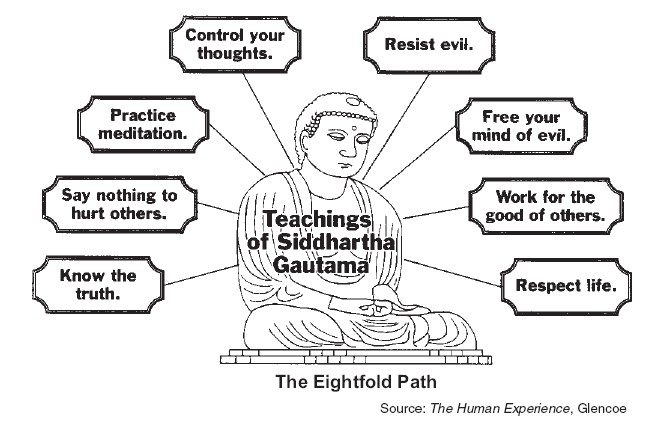|
|
| (11 intermediate revisions by 4 users not shown) |
| Line 1: |
Line 1: |
| − | Return to [[History 8 India Vocabulary]]
| + | Enlightenment was first found by Buddha himself on his forty day journey. Buddha followed the Eightfold Path, or Middle Way, in search of his own enlightenment. He finally reached his enlightenment while sitting under the Bodhi Tree at the end of his forty day journey. |
| | | | |
| − | http://thecostaricanews.com/wp-content/uploads/2011/09/enlightenment2.jpg <ref>http://thecostaricanews.com/enlightenment-revisited/7746</ref>
| |
| | | | |
| − | =Definition=
| + | To reach enlightenment, requirements are needed to be met, such as knowing the truth, not hurting others, practicing meditation, controlling ones thoughts, resisting evil, freeing ones mind of evil, working for the good of others, and respecting life. |
| − | To have a full understanding of the meaning and purpose of all things. Enlightenment can be both secular as well as spiritual. It is a spiritual awakening to the world around you.<ref>History Notes March 28, 2012</ref> | + | |
| − |
| + | |
| − | ==Enlightenment in Hinduism==
| + | |
| − | In the Hindu religion, one can achieve enlightenment by adhering to the Five Great Duties as well as adhering to spiritual discipline. Once you have reached enlightenment, you receive moksha, liberation from samsara, the cycle of reincarnation. Every person must go through samsara before the achieve enlightenment. When traveling through the cycle of reincarnation, one must take into account The Law of Karma and the Five Great Duties. Enlightenment is the goal of every Hindu person. Enlightenment also gives hope to the people of a lower caste because it gives them a goal in life and keeps them from making wrong choices for fear of creating bad karma and forever continuing samsara. Enlightenment creates a unity in the diversity of India, for every Indian person has a common goal in life. Hindus believe that one day, all people will achieve enlightenment and receive moksha.<ref>History Notes March 28, 2012</ref>
| + | |
| | | | |
| − | ==Enlightenment in Buddhism==
| + | http://buddhistblog.files.wordpress.com/2010/02/eightfoldpath11.jpg |
| − | Buddhism has a similar concept of moksha which they named nirvana. Nirvana is also received at the end of reincarnation, '''however one can choose if they want to come back and not become one with the universe'''. <ref>History Notes April 2, 2012</ref>Buddha, also known as "The Enlightened One", created a way to achieve enlightenment which he called The Eightfold Path. By following the Eightfold path, one can be enlightened and receive nirvana. The Eightfold Path is a part of everyday life and must be fulfilled every day at all times in order to receive enlightenment. The Buddha's goal was to spread his knowledge around the world and help everyone achieve enlightenment.<ref>Manual for Cultural Foundations of Ancient Civilizations pg. 106-108</ref>
| + | |
| | | | |
| − | '''For additional information about enlightenment, visit http://endless-satsang.com/spiritual-enlightenment-spiritual-awakening.htm.'''
| |
| | | | |
| − | =References=
| + | Information found on Manual pages 137 and 137 |
| − | <references/>
| + | |
| | + | Picture found from http://buddhistblog.wordpress.com/ |
| | + | |
| | + | Hannah Cohen |
| | + | |
| | + | Return to [[History 8 India Vocabulary]] |
Latest revision as of 21:10, 13 April 2014
Enlightenment was first found by Buddha himself on his forty day journey. Buddha followed the Eightfold Path, or Middle Way, in search of his own enlightenment. He finally reached his enlightenment while sitting under the Bodhi Tree at the end of his forty day journey.
To reach enlightenment, requirements are needed to be met, such as knowing the truth, not hurting others, practicing meditation, controlling ones thoughts, resisting evil, freeing ones mind of evil, working for the good of others, and respecting life.

Information found on Manual pages 137 and 137
Picture found from http://buddhistblog.wordpress.com/
Hannah Cohen
Return to History 8 India Vocabulary
